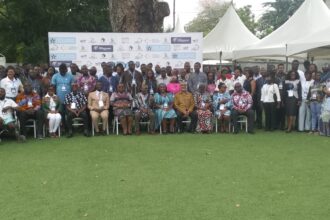Lack of access to adequate and nutritious food at all times remains a major health threat to Persons Living with HIV (PLHIV) as a recent study has found that 50 per cent of households with PLHIV are food insecure.
Conducted by the Ghana AIDS Commission (GAC) with support from the World Food Programme (WFP), the research which sampled 1,666 households in four regions of the country, identified 30 per cent of the 36,586 PLHIV engaged, as being on the “edge” of food insecurity and required immediate interventions.
It said PLHIV facing such conditions resorted to strategies including food rationing, begging, relying on less expensive or less preferred meals, skipping meals the entire day and harvesting immature crops among others to cope with the situation which undermined the success of effective HIV treatment.
Lead Consultant and Senior Lecturer at the School of Public Health of the University of Ghana, Dr Amos Laar, who presented the research findings in Accra yesterday, said food insecurity among PLHIV was highly prevalent in the Northern Region (24.0 per cent) with the Brong Ahafo recording the lowest of 16.4 per cent.
“Over 96 per cent of these HIV-positives reported take correct doses of anti-retroviral (ART) and other prescribed medications given them as directed, however, 91 per cent of them were able to take their medications at the right time and also with the appropriate food.
Among those who couldn’t adhere to their medications cited reasons including no food, money, stigma, forgetfulness, sickness and spiritual reasons assigned to the illness.”
Dr Laar, among others, called for the upscale of social protection and capacity building interventions to build sustainable livelihoods for PLHIV suggesting that “for instance government in line with their policy on livelihood empowerment against poverty (LEAP) may include food insecure PLHIV households deploying dehumanising coping strategies as beneficiaries.”
He suggested a periodic update of a register to keep records of all vulnerable and insecure households for efficient programming and roll out of interventions as the GAC together with its partners undertake annual food security and vulnerability profiling of PLHIV to improve food and nutrition as well as health outcomes for patients.
On the issue of female headed households increasingly at risk of food insufficiency and among “borderline groups”, the Consultant called for the prioritisation of such households in the designing and deployment of interventions to address food insecurity.
The Acting Director-General of GAC, Mr Kyeremeh Atuahene explained that the research undertaken between July and November 2018 was to promote adherence to anti-retroviral treatment and to ensure that the nutritional status of such vulnerable population did not decline further.
“2018 marked the transitional period between the end of the WFP’s country assistance programme and a new five-year country strategic plan (CSP, 2019-2023) hence the need for a follow up assessment on food security and vulnerability among PLHIV to identify gaps to inform the CSP,” he said.
Mr Atuahene assured of working with the Ministry of Gender, Children and Social Protection and the Ministry of Food and Agriculture to harness government interventions to benefit PLHIV.
“We will address the policy issues in the report to reflect in the national strategic plans to address food and nutrition for PLHIV,” he said, urging the Network of Association of Persons living with HIV (NAP+) to work at empowering its members to lead economically viable lives to improve living conditions.
Source: Ghanaian Times














